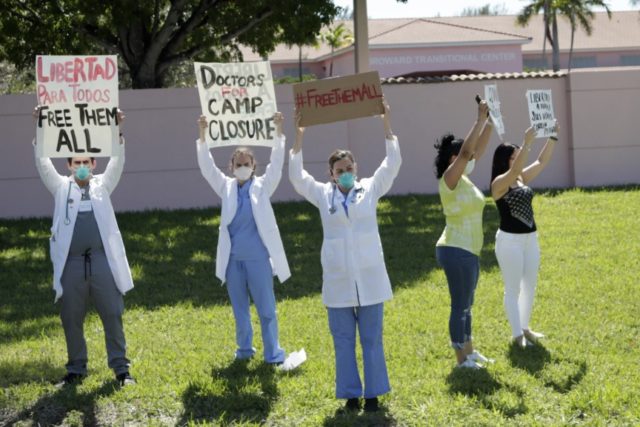A federal judge has ordered authorities to release hundreds of immigrants from three Florida detention centers to prevent a wider spread of the coronavirus
MIAMI (AP) — A federal judge ordered authorities to release hundreds of immigrants from three Florida detention centers to prevent a wider spread of the coronavirus and protect detainees with underlying conditions.
U.S. District Court Judge Marcia Cooke issued an order late Thursday for the U.S. Immigration and Customs Enforcement to begin the steps to bring down the number of detainees from 1,400 to about 350 within two weeks.
The Florida order is the latest issued by a federal judge seeking the release of immigrants, following others in states such as California and Louisiana as coronavirus infections among detainees have risen to 490 with 1,030 tested. But other lawsuits had centered on the elderly and those at high-risk and had not resulted in ordering such a dramatic release.
In Miami, seven detainees at the Krome Detention Center have tested positive for COVID-19. And court filings state at least eight staff members have been infected at the same facility.
The judge said she found violations of the Fifth and Eight Amendments that protect due process and against unusual punishment as conditions worsen each day at Krome and authorities have failed at practicing social distancing.
“These failures have placed petitioners at a heightened risk of not only contracting COVID-19, but also succumbing to the fatal effects of the virus as some of the petitioners have serious underlying medical illness,” Cooke wrote in the document. “Such failures amount to cruel and unusual punishment because they are exemplary of deliberate indifference.”
Cooke ordered ICE to submit a report Sunday with the steps to release detainees. The judge also gave ICE two days to give masks to every detainee at the three Florida facilities, in Miami, near Fort Lauderdale and Glades County in Central Florida.
Immigrant rights groups celebrated the judge’s decision saying there was no justification to keep immigrants fighting civil matters behind bars in the middle of a pandemic.
“Their wholly unnecessary detention has led to catastrophic outbreaks that will soon burden an already strained health care system,” said Paul R. Chavez, an attorney for the Southern Poverty Law Center.
A group of immigrant rights activists gathered on Friday to demand the release of detainees at one of the three facilities in Pompano Beach, north of Fort Lauderdale. Immigrants older than 60 have been released from there, and the overall population has decreased by 35%, court documents said.
An ICE spokesman said he could not speak specifically about the lawsuit as litigation is pending. The agency says it reviews releases on a case-by-case basis and has released nearly 700 people from custody around the country due to the spread of the virus.
A series of orders from federal judges have forced ICE in recent weeks to consider releasing detainees considered high-risk if infected with COVID-19.
In California, Judge Dana Sabraw ordered ICE to identify detainees at a San Diego detention center who are at least 60 years old or people with high-risk medical conditions so they could be released.
In Louisiana, Magistrate Judge Joseph Perez-Montes recommended the release of 13 detainees in several facilities.
“Under ordinary circumstances, ICE often releases civil detainees who do not pose a risk of flight or danger,” Perez-Montes said. “Under these extraordinary circumstances, release is an even more viable option.”
The Florida complaint filed on behalf of 34 immigrants on April 13 sought the immediate release of detainees at three Florida facilities saying they were at risk of infection because officials were not following guidelines to prevent the spread of COVID-19.
According to testimonies from detainees cited in the complaint, there is not enough soap and some said they had not received masks or gloves even after asking for them. Some men said they continue to be close to others with flu-like symptoms because of cell and sleeping arrangements.
____
Associated Press writer Nomaan Merchan contributed to this report from Houston.

COMMENTS
Please let us know if you're having issues with commenting.